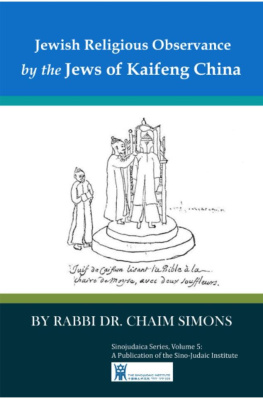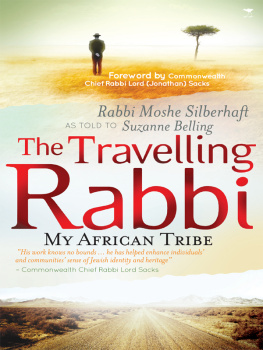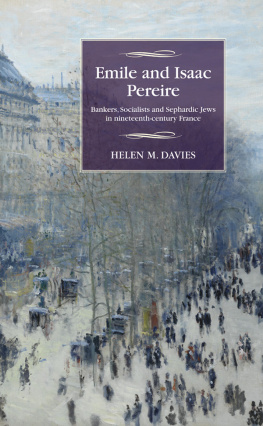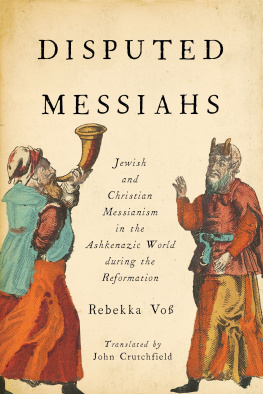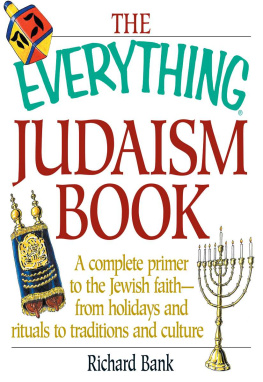Bridging Traditions
Demystifying Differences Between
Sephardic and Ashkenazic Jews

Haim Jachter

OU Press
Maggid Books
Bridging Traditions
Demystifying Differences Between Sephardic and Ashkenazic Jews
First Edition, 2021
OU PRESS
An imprint of the Orthodox Union
11 Broadway, New York, NY 10004
www.oupress.org
Maggid Books
An imprint of Koren Publishers Jerusalem Ltd.
POB 8531, New Milford, CT 06776-8531, USA
& POB 4044, Jerusalem 9104001, Israel
www.maggidbooks.com
Haim Jachter, 2021
Cover art: Baklava image: Newfabrika Freepik.com
The publication of this book was made possible
through the generous support of The Jewish Book Trust.
All rights reserved. No part of this publication may be reproduced,
stored in a retrieval system or transmitted in any form or by
any means, electronic, mechanical, photocopying, or otherwise,
without the prior permission of the publishers, except in the case
of brief quotations embedded in critical articles or reviews.
ISBN 978-1-59264-574-9, hardcover
Printed and bound in the United States
In Loving Memory and Honor of
Albert Allen
"
Mr. Albert Allen was born in Cairo, Egypt, and was dedicated to supporting and furthering Jewish causes. A founding member and gabbai of the Sephardic Minyan of Englewood, NJ, he was also involved in many other Jewish organizations including Yeshiva University, Yeshiva of North Jersey, Congregation Ahavath Torah of Englewood, NJ, and the Jewish Outreach Network. His endeavors were conducted with warmth, wisdom and generosity. He is greatly missed by his family and all who came in contact with him.
Dedicated by
The Allen Family
Charles and Julie Fleischner
Scott and Kelly Lichtenstein
In Loving Memory and Honor of
Sandra D. Bodenheimer
and as an expression of gratitude
to the Ribbono Shel Olam.
Dedicated by
The Bodenheimer and Shushan Family
In Loving Memory and Honor of
Harry I. Varon | Beverly R. Varon |
Rachel Varon | Anne Israel |
Howard S. Altschul
Dedicated by
Heidi and Jack Varon
In Honor of
Congregation Shaarei Orah,
the Sephardic Congregation of Teaneck
An oasis of love for and dedication to Sephardic life
that has brought great fulfillment and joy to countless
individuals and families. May our beloved Kehillah continue
to grow and flourish with Hashems bountiful Berachot.
Dedicated by
The Allen Family
The Bodenheimer Family
The Varon Family
Rabbi Meir Gavriel Elbaz, Rabbi and Dayan of the
Sephardic Congregation of Kew Gardens Hills, NY
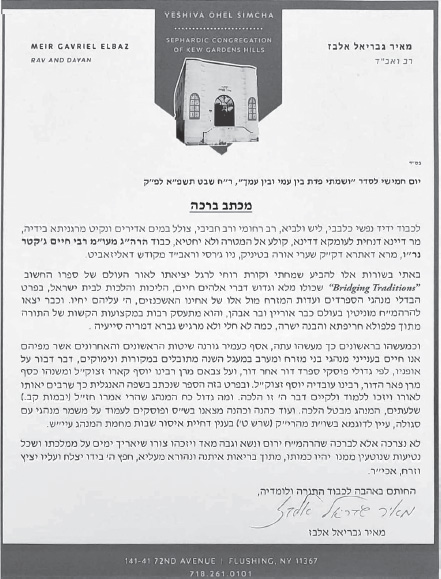
Editors Note: The Michtevei Beracha are arranged in alphabetical order according to the English names of the authors.
Rabbi Menachem Genack, CEO of OU Kosher, General Editor of OU Press, and Rabbi of Congregation Shomrei Emunah, Englewood, NJ

Rabbi Shmuel Khoshkerman, Rabbi of Congregation Ner
Hamizrach of Atlanta, Georgia
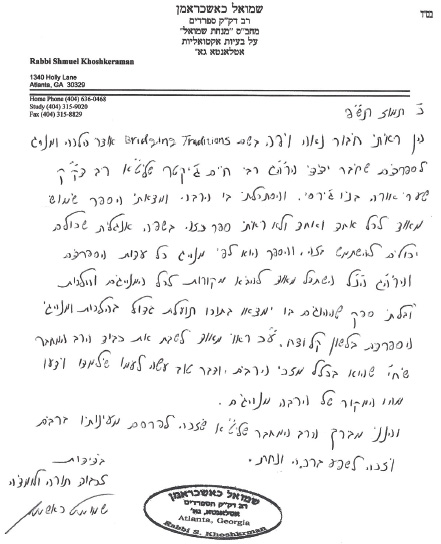
Rabbi Mordechai Lebhar, Rosh Kollel of Los Angeles
Intercommunity Kollel

Editors Note: Rabbi Lebhars comments on Bridging Traditions, which accompanied his Michtav Beracha, can be found in Appendix A.
M y Sephardic journey began with a summer spent in the HaTikva Quarter of Tel Aviv in 1984 as part of a group of students from Yeshiva University. We engaged in a wide variety of religious outreach activities to the community. During this impactful summer, I was exposed to a wide variety of Sephardic practices, including Yemenite, Syrian, and Iraqi synagogues.
My Sephardic friend Dr. David Serur continued to guide me in Sephardic practice and culture during our many years of avruta learning of the teshuvot (responsa) of Rav Ovadia Yosef.
Learning Rav Ovadia Yosefs sefarim and hearing him speak when he visited Yeshiva University during my years of Rabbinic studies have been life transforming. Rav Ovadia has raised the bar of Torah knowledge in a unique and extraordinary manner. Meeting him in person in July 1993 was an overwhelming experience for me. His intense expression and words are deeply etched in my memory, and I am incredibly grateful for his written authorization to serve as a get (Jewish Divorce) administrator.
The major event in my Sephardic journey, however, was being chosen in 2000 to serve as the Rav of the fledgling Congregation Shaarei Orah, the Sephardic Congregation of Teaneck.
Every day is a learning experience at Shaarei Orah, and I am grateful for everything our beloved congregants have taught me. This book consists of some of the many shiurim I have delivered over the years at Shaarei Orah. I aspired to transmit much of the energy and excitement surrounding this learning to our readers.
Special mention must be made of Heidi and Jack Varon, who have served as pillars of the Shaarei Orah community for many years. Their steadfast kindness, dedication, and wisdom have built Shaarei Orah into a warm and vibrant congregation where Sephardic life flourishes in the midst of the Teaneck, New Jersey Jewish community. Heidi and Jack have been especially supportive of my writings over the years, and I thank them for their sponsoring the publication of this work. I am honored to dedicate this volume in memory of Heidis father, Mr. Howard Altshul zl, and Jacks parents, Mr. Harry and Mrs. Rachel Varon zl.
Immediately after assuming the position at Shaarei Orah, I began to seek halachic guidance from my bet din colleague and friend Rav Shmuel Khoshkerman of Atlantas Congregation Ner HaMizrach. Rav Shmuel, in his quiet manner, is a master of Sephardic Halacha and is wise beyond words in his leadership of his congregation, whose makeup is similar to that of Shaarei Orah. I am grateful that Rav Khoshkerman took from his precious time to review this work and add dozens of very important comments. He is truly one of the greatest Sephardic Rabbanim in North America.
I am also grateful for the many people whose insights and comments have immeasurably enriched this book. I wish to specifically thank Rav Mordechai Djavaheri and Rav Ike Sultan, two young members of the Kollel at Yeshiva University, for their many and varied insights, which greatly improved the quality of this work. These two young men are of great promise, and we look forward to them emerging as leaders of the Sephardic community in the decades to come bezrat Hashem. I also thank Rav Jonathan Cohen for his help regarding the chapters on Yemenite Jews.
Rav Ely Allen, with whom I have had the privilege and honor of sharing the Rabbinic position at Shaarei Orah, is also owed much gratitude. Rav Allen has been a constant source of support and encouragement. I am deeply honored that he chose to sponsor this work in memory of his father, Mr. Albert Allen
Next page

